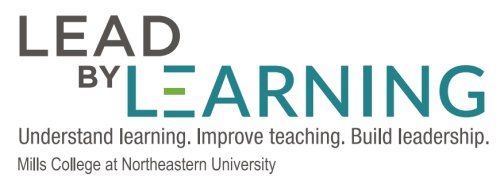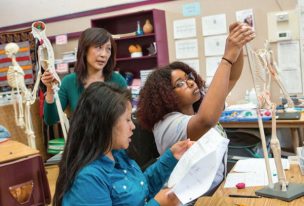Powerful Impact: Restorative Justice + Teacher-led Inquiry
 Mills Teacher Scholar, Dana Sudduth, has been teaching in Oakland for over 20 years, and many Oakland students have learned strong reading skills thanks to her excellent teaching. This year, she was asked to apply her understanding of reading
Mills Teacher Scholar, Dana Sudduth, has been teaching in Oakland for over 20 years, and many Oakland students have learned strong reading skills thanks to her excellent teaching. This year, she was asked to apply her understanding of reading
to a group of students at Montera Middle School. These were students who, as Dana wrote in one of her Mills Teacher Scholars reflections, “were chosen for this class because of low test scores. They consist of mostly African American and Latino
students.”
She began by using the Achieve 3000 reading program, which tracks lexile levels and comprehension growth, in partnership with teaching reading strategies in her English Language Arts Strategies class. Early in the year, Dana noticed some discrepancies in student performance data. In one of her reflections, Dana wrote: “When I began looking at the data I noticed that students were improving their reading scores, their scores did not necessarily translate to being successful in the classroom.”
Dana found that students would come to her class and complain about other classes, blaming their lack of success on their teachers. She began to explore with her students the issue of self-motivation. In conjunction with a monthly Restorative Justice circle supported by the district, students began to identify issues that were troubling them. After the Restorative Justice discussions, Dana asked her students to write reflections about the issues raised, and about what was happening in their classes.
Dana writes, “Self-motivation is a huge piece to my students being successful. … So I first conferenced them and showed them their CST scores, their SRI scores and their Achieve 3000 scores. I explained what all that meant for them and what scores they needed to attain to get their grades up. I implemented a reward system for students who were receiving 100% on their Achieve 3000 scores. I had my students write down their life goals. We drew life maps and discussed obstacles that might hinder someone and how they can overcome these obstacles. I also had my students memorize the A-G requirements. We have them posted in our classroom and they have it posted in their homes. I have my students reading about other people who are in similar situations as they are and how they were able to overcome their obstacles and become successful. Along with the occasional check-ins my students are meeting monthly with our Restorative Justice counselor to discuss ways in which they can be successful in the classroom and on their tests.”
In a recent reflection, Dana wrote, “I was pleasantly surprised at how well some of my students are doing. I was also surprised that many of my students were able to articulate exactly what they were doing to improve or not improve … My students are definitely beginning to take some ownership in their own learning. … Overall many of my students are starting to realize that if they do the work they will get better grades. The question now becomes once they understand this, how do I get them to be self-motivated to continue without me constantly reminding them? … My next steps include developing a daily check-in so they are regularly looking at what they are doing … Ultimately, I am hoping that my students will be able to monitor their own work without having me or a check-list as a crutch.”

